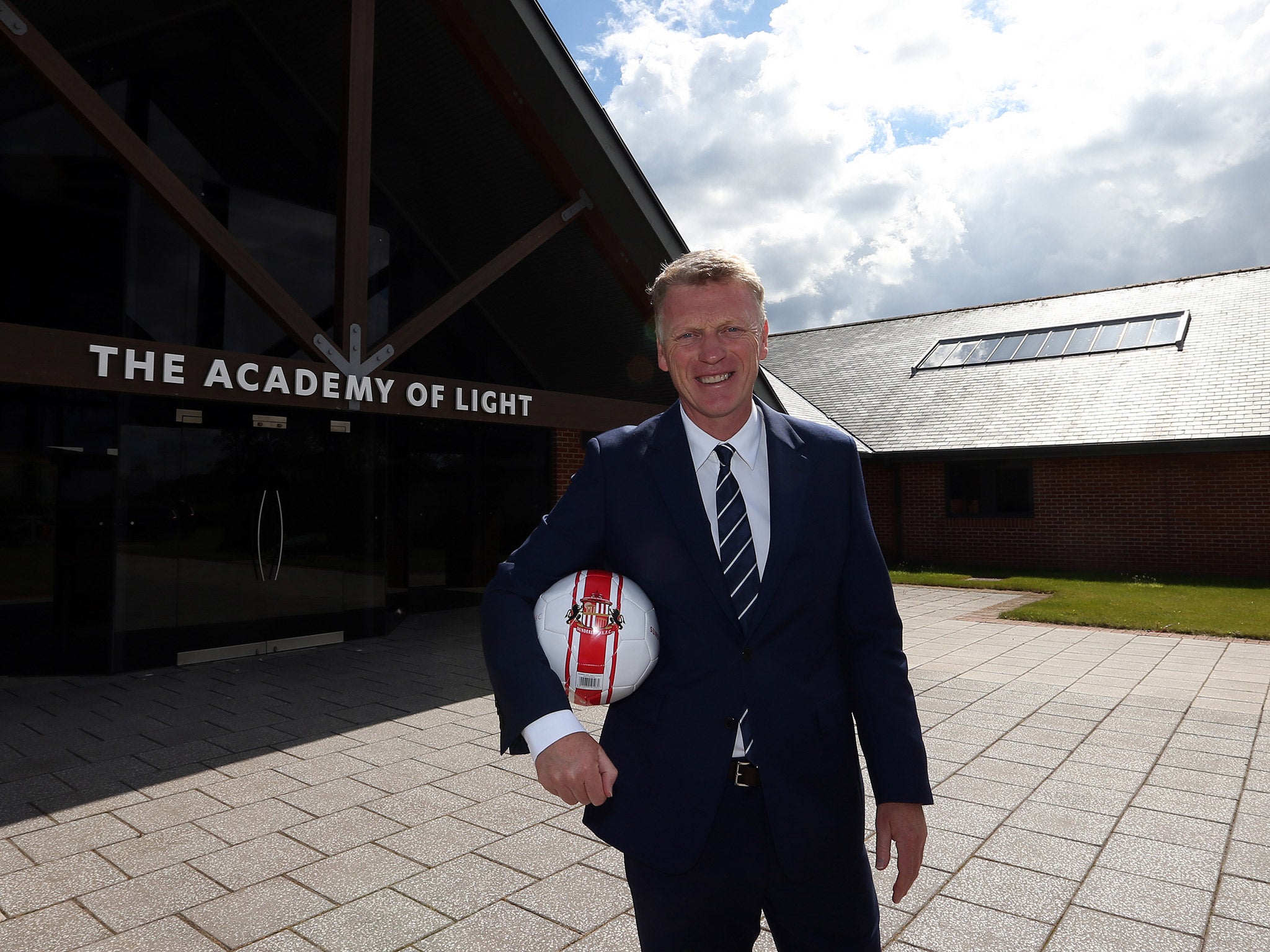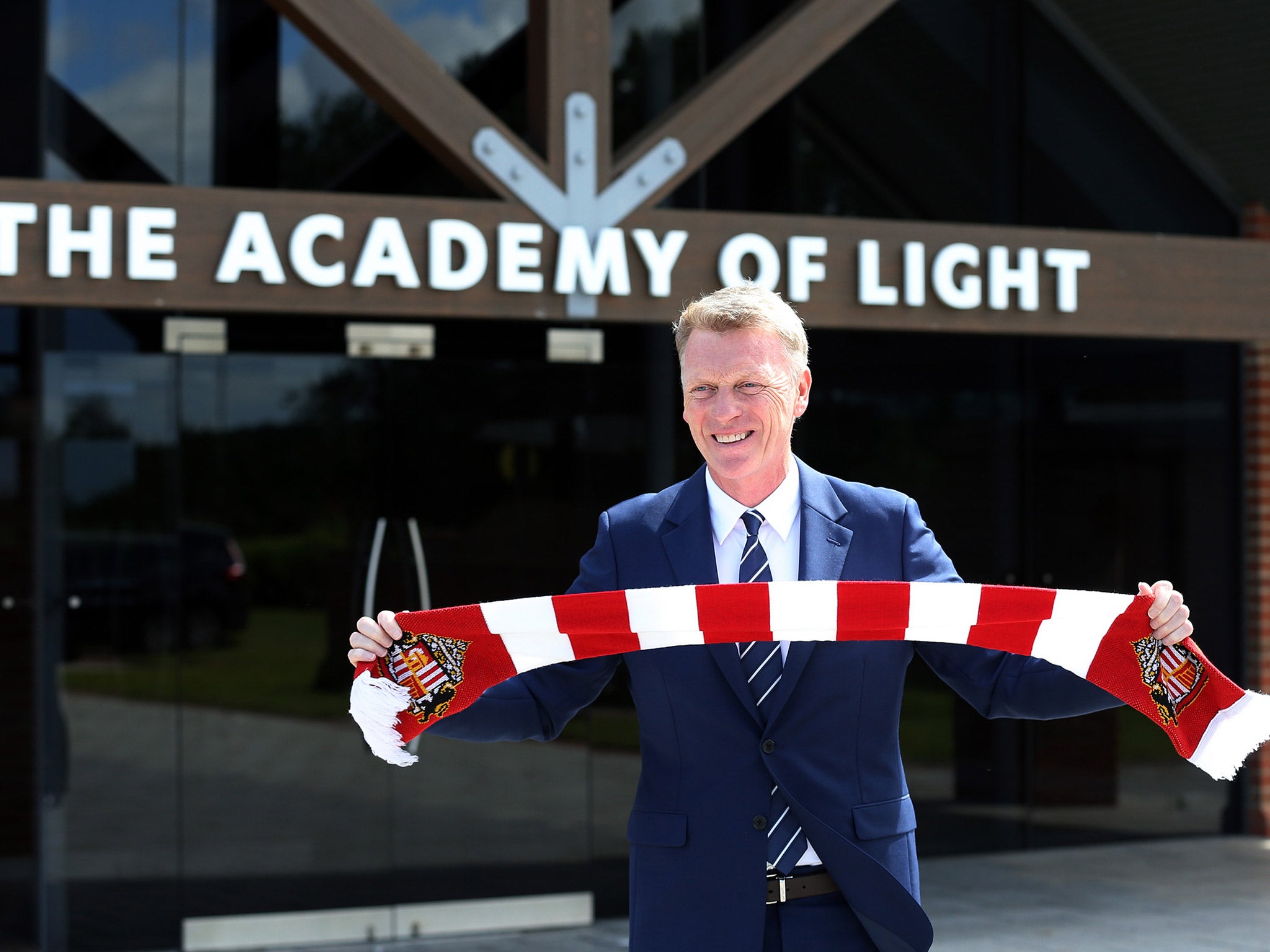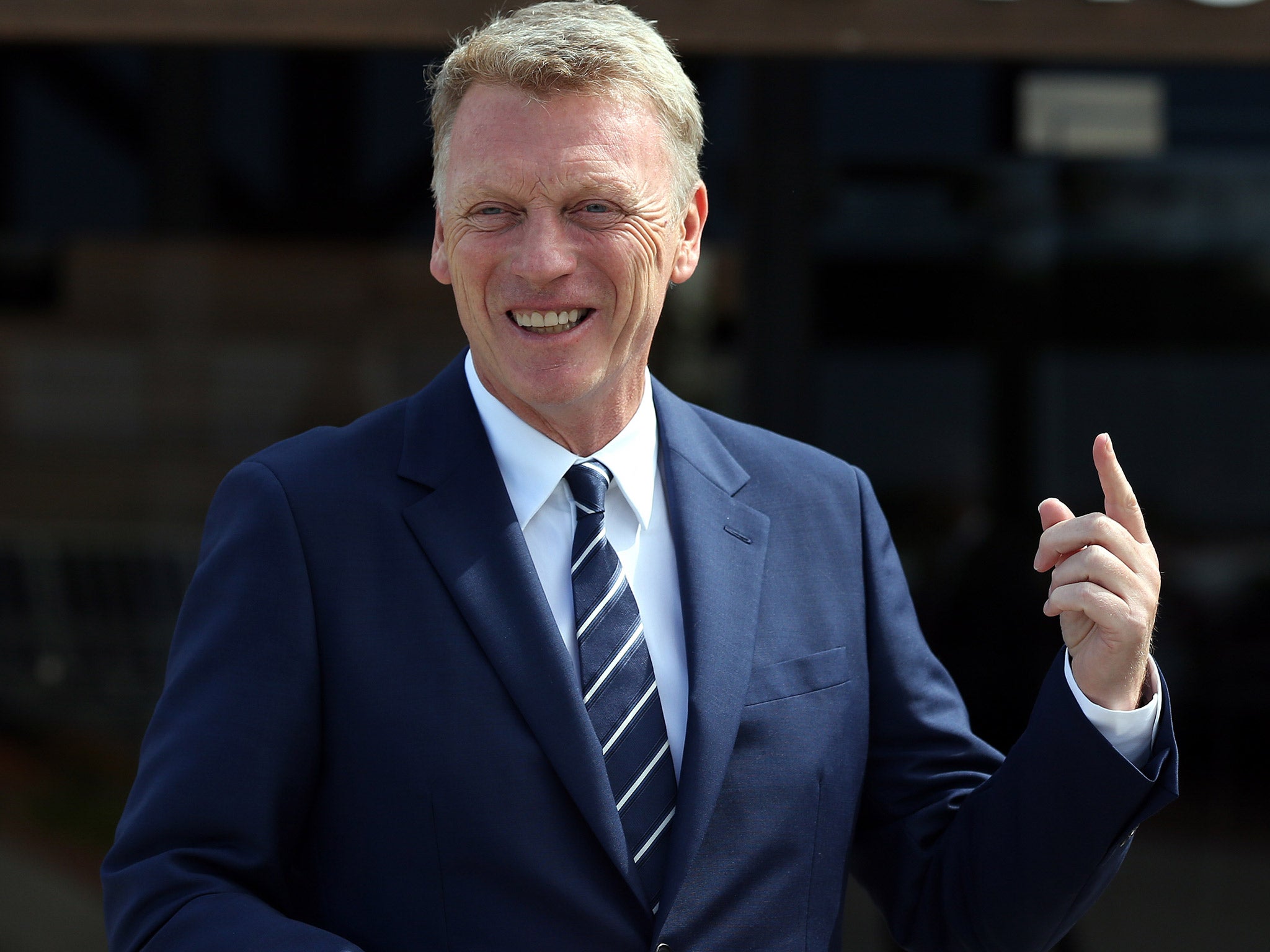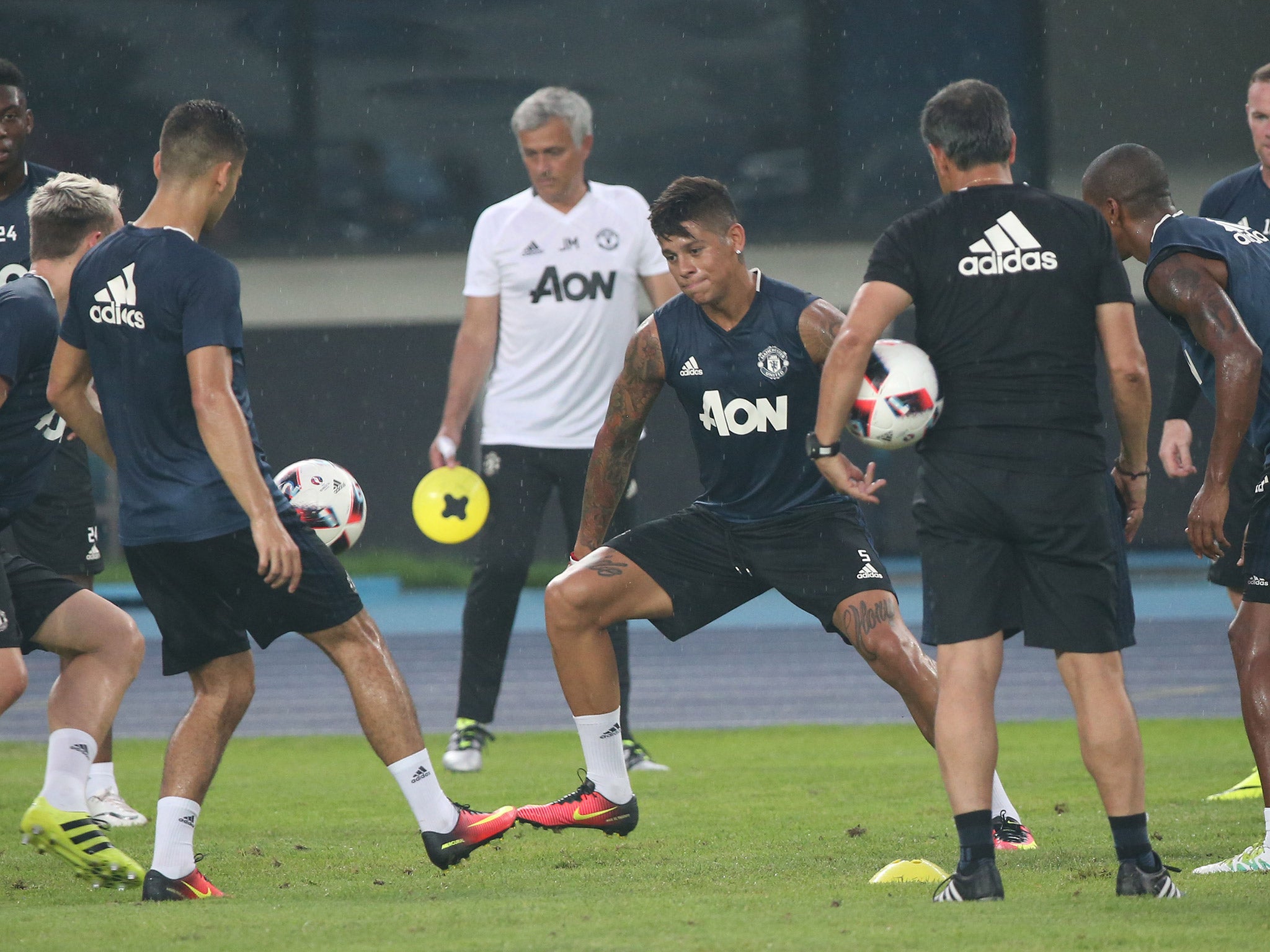David Moyes can rebuild reputation for all British managers at Sunderland after his Manchester United failure
Moyes's United failure triggered the death of the British manager, but at Sunderland he has the opportunity to help those who were unwittingly set back by his inability to succeed

Your support helps us to tell the story
From reproductive rights to climate change to Big Tech, The Independent is on the ground when the story is developing. Whether it's investigating the financials of Elon Musk's pro-Trump PAC or producing our latest documentary, 'The A Word', which shines a light on the American women fighting for reproductive rights, we know how important it is to parse out the facts from the messaging.
At such a critical moment in US history, we need reporters on the ground. Your donation allows us to keep sending journalists to speak to both sides of the story.
The Independent is trusted by Americans across the entire political spectrum. And unlike many other quality news outlets, we choose not to lock Americans out of our reporting and analysis with paywalls. We believe quality journalism should be available to everyone, paid for by those who can afford it.
Your support makes all the difference.It was all so different three years ago. Back then, David Moyes was at the summit of English football, proudly waving the flag for British managers, having succeeded the Godfather of them all in Sir Alex Ferguson at Manchester United.
Moyes, having spent eleven years forging his reputation as a team architect and club builder at Everton, had broken through the glass ceiling which was stunting the development of so many home-grown managers by securing the United job.
The biggest clubs simply did not go British any more. Liverpool had replaced Kenny Dalglish with Brendan Rodgers, but this was a Liverpool battling simply to qualify for the Europa League rather than win the Premier League, so it was sporting decline, rather than a bold rejection of the status quo, which prompted the Anfield hierarchy to appoint the Northern Irishman.
United, however, had just won the Premier League title. They were blue-chip Champions League regulars and, in contrast to the likes of Chelsea, Manchester City and Arsenal, believed a British manager familiar with the Premier League could disprove the theory that only the overseas elite – Ferguson being the obvious exception – were capable of managing English football’s most powerful clubs.
That was the message at the time, but the narrative has since been altered once or twice with Moyes failing horribly and those who made the appointment desperate to wash their hands of responsibility, insisting that the Scot was only handed the job because so many of those overseas elite coaches – Jose Mourinho, Pep Guardiola, Carlo Ancelotti, Jürgen Klopp, Diego Someone (the list goes on) – were either not interested or already committed to jobs elsewhere.
United have since abandoned the ‘British is Best’ policy by turning first to Louis van Gaal and then Mourinho in an effort to restore the glory days of the Ferguson era, but the ripples of Moyes’s failure at Old Trafford are still being felt by those British managers attempting to prove their worth in the Premier League.
Which is why Moyes’s appointment as Sunderland manager, following Sam Allardyce’s elevation to the England job, could yet prove so crucial for those who were unwittingly set back by his inability to succeed at United.
Whether by coincidence or design, British managers have become a dying breed in the Premier League since Moyes and United hit the rocks in 2014.
Had Moyes been able to build on Ferguson’s legacy and keep United at the top, there would have been no excuses for those Premier League club owners who have increasingly looked abroad for their new coaches.
But aside from Ellis Short, Sunderland’s American owner, the decision-makers at Premier League clubs have now turned their eyes away from the domestic market and gone for continental managers.
Where once the likes of Jozef Venglos (Aston Villa) and Christian Gross (Tottenham) were viewed as curious appointments from overseas, eyebrows are now raised when a top club goes British.

Moyes, incredibly, is the only British manager to have landed a Premier League job so far this summer and he has succeeded the only British manager (Allardyce) to have been given a permanent contract by a top flight club last season.
Since the start of the 2015-16 Premier League campaign, United, Manchester City, Liverpool, Everton, Chelsea, Southampton, Swansea, Watford, Aston Villa and Newcastle have all dispensed with managers and appointed a foreign coach. Sunderland sacked a Uruguayan, Gus Poyet, and turned to Allardyce.
Of those clubs mentioned above, Villa (Tim Sherwood), Liverpool (Rodgers), Swansea (Garry Monk) and Newcastle (Steve McClaren) all sacked British managers and replaced with foreign – Villa and Newcastle were subsequently relegated.
Hull City, promoted under Steve Bruce, may yet buck the trend and appoint a British candidate to replace their recently-departed manager, but the likelihood is that it will be Gianfranco Zola rather than Ryan Giggs or Mike Phelan who end up in that particular hot-seat.

Moyes can help change the perception of British managers at Sunderland, however.
The 53-year-old has been scarred by his experience at United, but the Old Trafford mess was not entirely of his making.
He has always been a diligent coach, a committed manager, and a man with an eye for emerging talent such as John Stones, Seamus Coleman and Adnan Januzaj.
Real Sociedad was perhaps the wrong club at the wrong time, but Moyes will have learned from the experience and be a better manager for it.

Sunderland, a club in desperate need of managerial stability, will benefit from Moyes’s long-term planning and his determination to prove he is much more than the man who really never had a chance at Old Trafford.
Sunderland will be good for Moyes and Moyes will be good for Sunderland, but if it works out, the biggest winners of all will be those British managers who are too often finding themselves on the outside, looking in, when it comes to the Premier League.
Rooney’s relationship with United more than just business
There have been more than a few highs and lows during Wayne Rooney’s 12 years at Manchester United, with some of the lows – high-profile flirtations with Manchester City and Chelsea primarily – ensuring that his testimonial game against Everton on Wednesday evening will not be universally welcomed by the more unforgiving element of United’s fan base.
Rooney has never hidden his Everton roots at Old Trafford, which is why his former club will provide the opposition tomorrow night, so his cold-headed readiness to leave United at times has betrayed the perception of his relationship with the club being nothing more than purely business, with both Rooney and United ultimately staying together because they were good for each other.
Yet he has won everything worth winning with United at least once and stands four goals short of matching Sir Bobby Charlton’s all-time goal haul for the club, so it really has been more than just business and why his determination to raise £5m for children’s charities from his testimonial deserves a full house on Wednesday.
China not ready to deliver World Cup yet
One week in China to cover the International Champions Cup fixtures involving Manchester United, Manchester City and Borussia Dortmund recently was enough time to make the snap judgement that the world’s most populous nation must overcome several obstacles before achieving its ambition of hosting a World Cup.

China possesses the stadia, without question, to stage the tournament, but the July heat which exceeded 40 degrees Celsius in Shanghai and heavy rain in Beijing suggests that Fifa may have to consider another mid-season World Cup to make China work.
And after all the politics involved in shifting Qatar 2022 from summer to winter, will there really be an appetite to do it all again?
Join our commenting forum
Join thought-provoking conversations, follow other Independent readers and see their replies
Comments